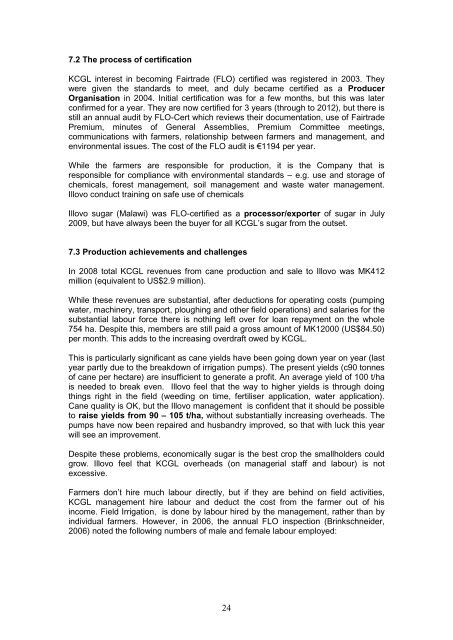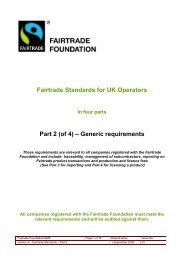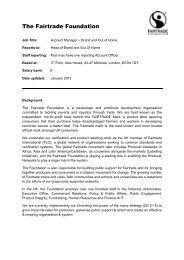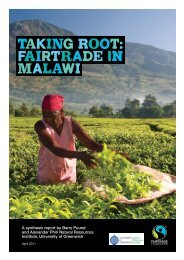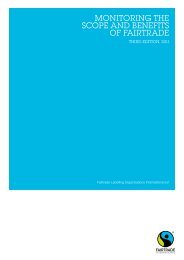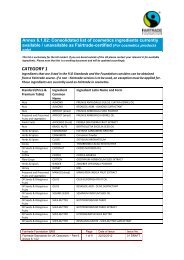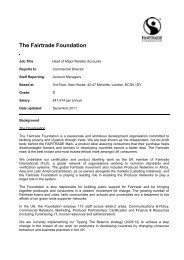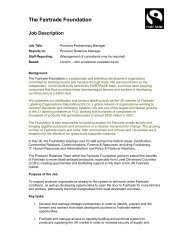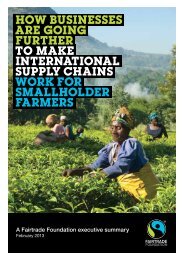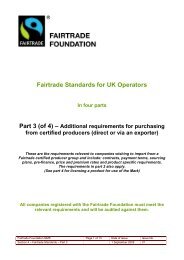longitudinal impact assessment study of sugar producers in malawi
longitudinal impact assessment study of sugar producers in malawi
longitudinal impact assessment study of sugar producers in malawi
You also want an ePaper? Increase the reach of your titles
YUMPU automatically turns print PDFs into web optimized ePapers that Google loves.
7.2 The process <strong>of</strong> certification<br />
KCGL <strong>in</strong>terest <strong>in</strong> becom<strong>in</strong>g Fairtrade (FLO) certified was registered <strong>in</strong> 2003. They<br />
were given the standards to meet, and duly became certified as a Producer<br />
Organisation <strong>in</strong> 2004. Initial certification was for a few months, but this was later<br />
confirmed for a year. They are now certified for 3 years (through to 2012), but there is<br />
still an annual audit by FLO-Cert which reviews their documentation, use <strong>of</strong> Fairtrade<br />
Premium, m<strong>in</strong>utes <strong>of</strong> General Assemblies, Premium Committee meet<strong>in</strong>gs,<br />
communications with farmers, relationship between farmers and management, and<br />
environmental issues. The cost <strong>of</strong> the FLO audit is €1194 per year.<br />
While the farmers are responsible for production, it is the Company that is<br />
responsible for compliance with environmental standards – e.g. use and storage <strong>of</strong><br />
chemicals, forest management, soil management and waste water management.<br />
Illovo conduct tra<strong>in</strong><strong>in</strong>g on safe use <strong>of</strong> chemicals<br />
Illovo <strong>sugar</strong> (Malawi) was FLO-certified as a processor/exporter <strong>of</strong> <strong>sugar</strong> <strong>in</strong> July<br />
2009, but have always been the buyer for all KCGL’s <strong>sugar</strong> from the outset.<br />
7.3 Production achievements and challenges<br />
In 2008 total KCGL revenues from cane production and sale to Illovo was MK412<br />
million (equivalent to US$2.9 million).<br />
While these revenues are substantial, after deductions for operat<strong>in</strong>g costs (pump<strong>in</strong>g<br />
water, mach<strong>in</strong>ery, transport, plough<strong>in</strong>g and other field operations) and salaries for the<br />
substantial labour force there is noth<strong>in</strong>g left over for loan repayment on the whole<br />
754 ha. Despite this, members are still paid a gross amount <strong>of</strong> MK12000 (US$84.50)<br />
per month. This adds to the <strong>in</strong>creas<strong>in</strong>g overdraft owed by KCGL.<br />
This is particularly significant as cane yields have been go<strong>in</strong>g down year on year (last<br />
year partly due to the breakdown <strong>of</strong> irrigation pumps). The present yields (c90 tonnes<br />
<strong>of</strong> cane per hectare) are <strong>in</strong>sufficient to generate a pr<strong>of</strong>it. An average yield <strong>of</strong> 100 t/ha<br />
is needed to break even. Illovo feel that the way to higher yields is through do<strong>in</strong>g<br />
th<strong>in</strong>gs right <strong>in</strong> the field (weed<strong>in</strong>g on time, fertiliser application, water application).<br />
Cane quality is OK, but the Illovo management is confident that it should be possible<br />
to raise yields from 90 – 105 t/ha, without substantially <strong>in</strong>creas<strong>in</strong>g overheads. The<br />
pumps have now been repaired and husbandry improved, so that with luck this year<br />
will see an improvement.<br />
Despite these problems, economically <strong>sugar</strong> is the best crop the smallholders could<br />
grow. Illovo feel that KCGL overheads (on managerial staff and labour) is not<br />
excessive.<br />
Farmers don’t hire much labour directly, but if they are beh<strong>in</strong>d on field activities,<br />
KCGL management hire labour and deduct the cost from the farmer out <strong>of</strong> his<br />
<strong>in</strong>come. Field Irrigation, is done by labour hired by the management, rather than by<br />
<strong>in</strong>dividual farmers. However, <strong>in</strong> 2006, the annual FLO <strong>in</strong>spection (Br<strong>in</strong>kschneider,<br />
2006) noted the follow<strong>in</strong>g numbers <strong>of</strong> male and female labour employed:<br />
24


